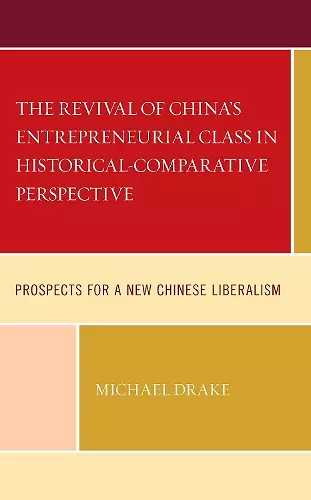The Revival of China's Entrepreneurial Class in Historical-Comparative Perspective
Prospects for a New Chinese Liberalism
Format:Hardback
Publisher:Bloomsbury Publishing PLC
Published:14th Oct '20
Currently unavailable, and unfortunately no date known when it will be back

The Revival of China's Entrepreneurial Class in Historical-Comparative Perspective: Prospects for a New Chinese Liberalism examines the evolution of China’s entrepreneurial class and prospects for entrepreneurial-driven political institutional change. Michael Drake posits that decades of economic reforms and social transformation have illuminated a fundamental contradiction in contemporary China—a rule-by-law closed political system governing over an emergent entrepreneurial class requiring property protection—that requires resolution. Drake argues that the Chinese Communist Party has one of two choices: crush the entrepreneurial class, and with it, economic growth and the party’s legitimacy, or cede to the entrepreneurs’ demands for the rule of law and political representation. Drake’s research shows the rise of liberal qualities—rationality, autonomy, property-law interests, political awareness, and political agency—among China’s emergent entrepreneurial class. As such, Drake argues that this liberal trajectory, in conjunction with a lack of viable alternatives for the party, will translate into a new Chinese liberalism, and ultimately, political change.
Drake, an independent scholar, asks whether the entrepreneurial class of China has come to resemble that of other economically developed nations. After introducing the research question and the development of a liberal (bourgeoisie) class in England and France in the first two chapters, he briefly treats the growth of business interests from the Sung Dynasty (c. 907) through the end of the Cultural Revolution (1976). The remaining substantive chapters examine how Deng Xiaoping's economic reforms advanced economic rationality and the autonomy of entrepreneurs; how predatory behavior of the Communist Party-state threatened property interests of business owners; and how business people interact with the state, i.e., whether they participate in the Communist Party, are active in business associations, or choose to leave the country or adapt to norms when challenged by corrupt practices. The author concludes that China is increasingly likely to experience "the emergence of a new Chinese liberalism and fundamental, entrepreneurial-driven, political institutional change" (p. 140). Other studies of capitalism in China are less optimistic, regarding censorship of the internet as encumbering democratization efforts. Comments from several business people whom Drake interviewed add interest to the study. Summing Up: Recommended. Advanced undergraduates through faculty; professionals. * Choice Reviews *
In this ground-breaking study, Michael Drake provides a comprehensive evaluation of China’s entrepreneurs as members of a new economic and political class. In contrast to research that emphasizes China’s political immobilism, Drake argues convincingly that this class can and will seek liberal transformation in coming years. As such, it provides an essential contribution to the debate on China’s political future. -- David Kerr
ISBN: 9781793619976
Dimensions: 228mm x 161mm x 19mm
Weight: 426g
168 pages